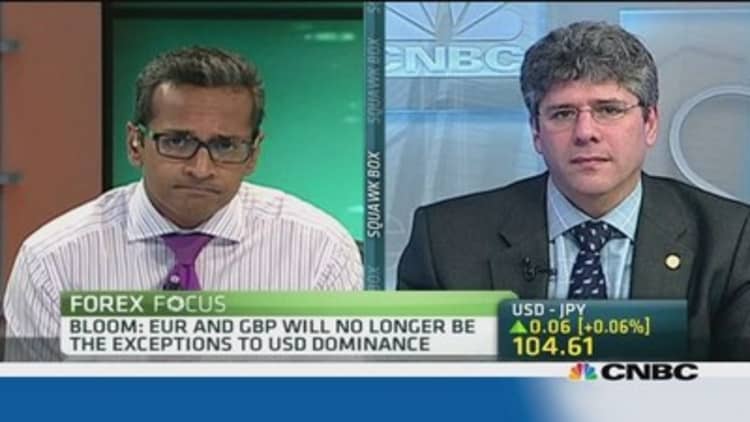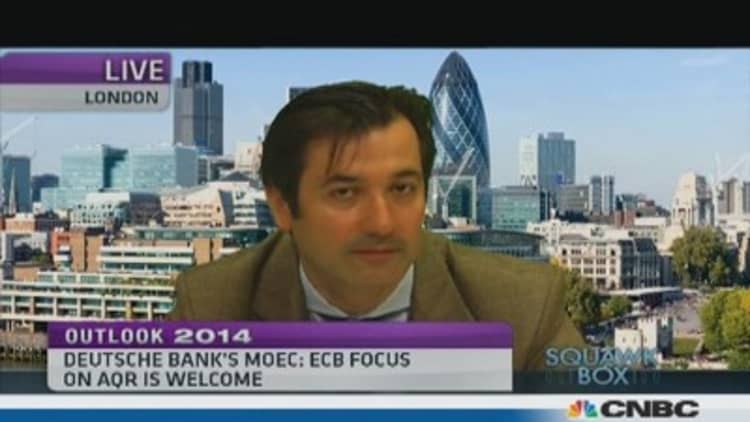As the plunged to a ten-week low on Monday following weak euro zone inflation data and amid general risk-off sentiment, analysts told CNBC the single currency could fall further.
The euro traded at $1.3477 early Monday in Asia, its lowest level since October, following a break of major support at $1.3506. Against the yen, it hit a two-month low of 137.38 yen.
(Read more: Deflation worries back as euro zone inflation falls again)
Investors were still reacting to Friday's weaker-than-expected inflation data showing a 0.7 percent on-year rise versus expectations for a 0.9 percent rise, the second consecutive month that the index surprised to the downside.
Lower energy prices dragged the overall figure lower, although the core consumer price index (CPI) – which excludes food and energy prices – ticked up to 0.8 percent, above the 0.7 percent forecast.
Emmanuel Ng, currency economist at Singaporean bank OCBC, said the contrasting perceptions of the U.S. Federal Reserve, which has started moving towards a more hawkish standpoint over the past year, and the more dovish ECB, would lead to more falls for the euro.
"We grow increasingly negative on the pair's prospects and if the $1.35 level is not re-taken, a drift towards the 200-day moving average ($1.3379) cannot be discounted," said Ng.

Meanwhile, Aaron Smith managing director of Pecora Capital, told CNBC, that the disparity between Fed and ECB policy was creating an arbitrage opportunity.
"Europe now has less inflation than Japan… which is heart stopping news. European policy makers may take this and use it as justification for easing," he said.
"On the other hand the Fed is keeping rates low and is committed to a low interest environment. I don't expect rate cuts this week, but I expect rumors and talk of further easing action and this would create the arbitrage opportunity," he said, adding that from a technical standpoint the euro also looked weak and in his view could fall to $1.25 at some point this year.
(Read more: Future bailouts? Do it yourself, says Bundesbank)
Chris Weston, chief market strategist at trading firm IG, was also bearish on the euro in 2014, and expects a number of headwinds to knock the single currency lower.
"I expect it [the euro] to end the year around $1.25 to $1.27. A large percentage of this will be driven by the U.S. side of the equation, however if inflation doesn't go the way they plan then we could see a number of measures imposed," he said.

ECB action
The ECB last cut its main interest rate in October to 0.25 percent from 0.5 percent, after inflation fell to a 47-month low of 0.7 percent. Now that inflation has re-touched the October low, many analysts expect a rate cut soon, and all eyes will be on Thursday's ECB meeting.
Boris Schlossberg, managing director at BK Asset Management, said the weaker data confirmed the euro zone is firmly in deflationary territory.
(Read more: The 'Merkel put' is a safe bet)
"Although ECB officials have steadfastly asserted that the declines in the price levels are temporary, the economic evidence is to the contrary," said Schlossberg, adding that CPI data has remained under the 1 percent mark for the past four months.
Schlossberg said he expected the data to put further pressure on the ECB to stimulate demand through a rate cut, especially if recent volatility in emerging markets continues to dampen risk appetite the world over.
"The pressure will be on ECB President Mario Draghi to take further action. We think a rate cut is likely to be the next move, if not this week then in March," added Jessica Hinds, economist at global research house Capital Economics.
(Read more: Nay sayers of euro? Here's why to be careful)
But analysts at investment bank Société Générale said in a preview of the ECB meeting that they expected the central bank to keep rates on hold, because in their view, policy makers' focus would be more on core inflation in the near term, which actually improved in the latest data.
"We expect the ECB to add more liquidity (medium-term LTRO) later in the spring… A refi rate cut by 10-15 basis points could happen earlier if core inflation dips further and if money market tensions remain," they added.
— By CNBC's Katie Holliday: Follow her on Twitter @hollidaykatie


